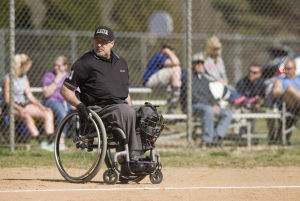In suburban St. Louis, Ladue Horton Watkins High School sprinter Annie Donnell ran the 400-meter dash for the first time this spring, after having run the 100-meters in her first three years on the track team. "I wasn't really sure what to expect," the junior told the St. Louis Post-Dispatch after the longer race. "It's always different when you run in a meet than when you practice on your track."
Nothing unusual here, except that Annie has been blind since birth.
To comply with Missouri State High School Activities Association guidelines, she runs tethered arm-in-arm to Ladue junior Allison Moehrle as her guide. The two met in sixth grade, became close friends, and have run together in nearly every practice and meet since their freshman year. "I've run races on my own," says Allison, "but I actually prefer to run with Annie. We work really well together."
"I Love This Game"
In suburban Maryland more than 700 miles from St. Louis, 52-year-old Rob McQuay umpires sub-varsity high school baseball, usually about three or four games a week. He has been at it for 16 years because, he says, "I love this game." "I enjoy the kids," he tells the Maryland Gazette, "I even enjoy the coaches." 
The umpires association president says that he gets "a lot of compliments on [McQuay's] work behind the plate from the coaches in high school and summer leagues, as well as his fellow umpires." Many umpires go unappreciated, but Rob McQuay does not appear to be one of them.
Nothing unusual here either, except that Rob McQuay is in a wheelchair when he calls balls and strikes and umps the bases. He has been a quadriplegic, with only limited use of his limbs, ever since he broke his neck in two places in a body surfing accident in 1990.
Teaching By Example
Annie Donnell and Rob McQuay are pursuing their passions in sports, which itself deserves respect. But whether they realize it or not, people who overcome disabilities in sports also set an example for students with disabilities who might have second thoughts about confronting barriers of their own, on and off the field.
Athletes with disabilities also influence students who, as they approach adulthood, may never have thought much about including people with disabilities in mainstream American life in accordance with their aspirations and abilities. Ladue's track coach told the Post-Dispatch how much Annie inspires her teammates. "You have kids who come out and then don't want to run. Then you have a kid who's in her situation and wants to run. It's pretty hard to look at her and say ‘I can't do this.'"
"We Know He's Overcome A Lot"
In 2013, the U.S. Education Department reminded public school districts that federal disability law requires them to maintain policies that include students with disabilities, if their abilities permit, and participation does not change the character of the game or compromise safety. Secretary of Education Arne Duncan said that public schools "may not exclude students who have an intellectual, developmental, physical, or any other disability from trying out and playing on a team, if they are otherwise qualified."
Equal opportunity should extend to adults with disabilities who have something positive to offer young athletes about the game itself, and about the values that sports seeks to teach. They may be officials such as Rob McQuay, or they may be coaches such as David Vince, varsity baseball coach at Monarch High School in Coconut Creek, Florida, who I wrote about back in 2005. Vince has two prosthetic legs because a birth defect led to amputations as a child; his players respected the example he set. "We know he's overcome a lot," said one of his pitcher's, "so if we miss a ground ball or strike out, we know we can go to him, and he'll remind us we can do it."
Participation by athletes and adults with disabilities, consistent with their abilities and their willingness to contribute, is best for the games themselves and best for America. Missouri track runners get a better race when Annie Donnell and her teammate Allison Moehrle run, and Maryland teams probably get a better game from Rob McQuay than from some other local umpires.
Sources: David Kvidahl, "Ladue's Donnell Inspires in Debut 400," St. Louis Post-Dispatch, Apr. 21, 2014; Dave Spandorfer, "Run for Another Series: Annie and Allison," http://info.runjanji.com/blog/run-for-another-series-annie-and-allison (June 4, 2014); T.C. Cameron, "Ump Adapts to Pursue Passion On Diamond," Maryland Gazette, Apr. 30, 2014; U.S. Dep't of Education, Arne Duncan, We Must Provide Equal Opportunity in Sports to Students with Disabilities (Jan. 25, 2013); Douglas E. Abrams, "The Quiet Heroes of Youth Sports for 2005," St. Louis Post-Dispatch, Jan. 1, 2006, p. 3B]



















